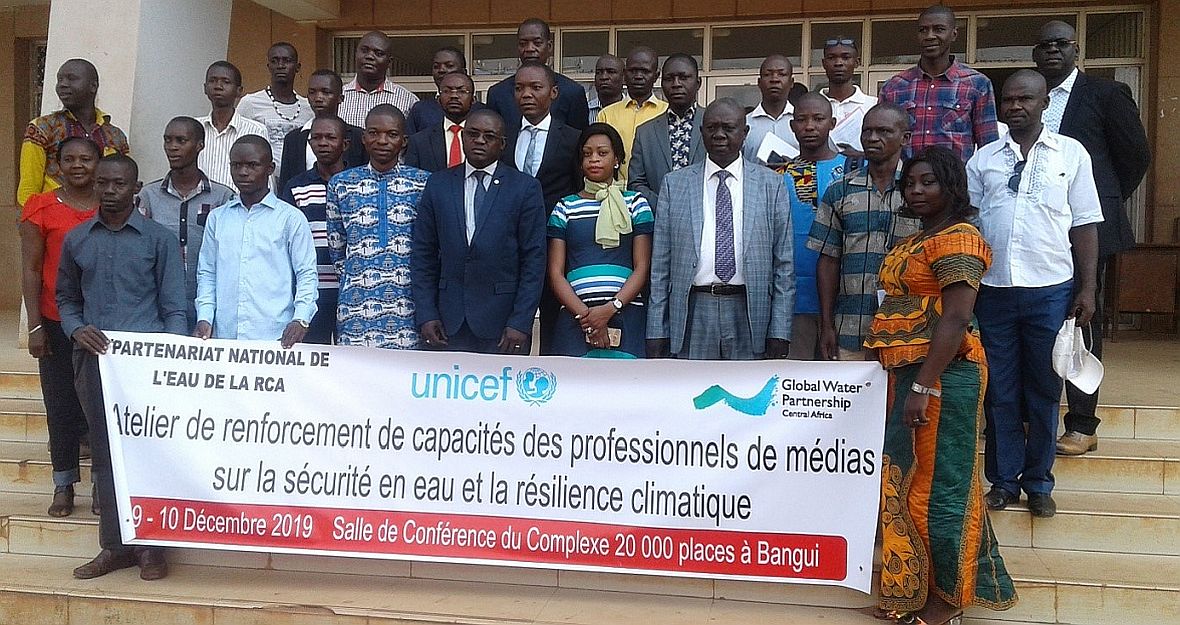The workshop on water security and climate resilience for media professionals gathered over thirty participants from the print, online and audiovisual media. Chaired by the President of PNE-RCA, Mr. Rodrigue YAKENDE the workshop focused on building the capacity of media professionals on the governance framework of water resources management, understanding the science of climate change, initiatives to combat climate change in Central Africa Republic (CAR) and the role of the media in informing and sensitizing stakeholders. In his opening remarks, the President of PNE-RCA presented the Water, Climate and Development Program (WACDEP) for Central Africa, under which the workshop was organized. The WACDEP in Central Africa was expanded for the period 2017-2019 to two additional countries, CAR and Sao Tome and Principe. CAR was selected due to the existence of a number of implemented, ongoing and planned actions on water security and climate resilience in the country. Mr. YAKENDE presented the key components and action areas for WACDEP implementation in the country, including a component focused on targeted activities to build the capacity of stakeholders to integrate water security and climate resilience into national development. He urged participants to be punctual and diligent in learning and sharing their experiences. Mr. YAKANDE also expressed gratitude to UNICEF and GWP-CAf for their support, and to the Ministry in charge of water for its active cooperation, in organizing the workshop.
In order to facilitate the workshop, a committee was set up with Mr. Sylvain Guebanda as chairman, Mrs. Divine Bazanghou, Vice President of PNE-RCA as the first Rapporteur and Mr. Parfait Désiré ZOGA, Coordinator of the IWRM and Environment platform as the second rapporteur. The workshop featured presentations and plenary discussions structured into five main sessions; concepts and principles of IWRM, water resources governance framework, the climate change dynamics (Drivers and Consequences for Water), initiatives to combat climate change in CAR, and the role and place of the media in informing and raising stakeholders’ awareness.
At the close of the workshop, participants expressed their gratitude to the workshop organizers and committed to contribute to the sensitization of stakeholders on water security and climate resilience. They also made a series of recommendations to key actors for enhancing water security and climate resilience which will facilitate the media’s role in IWRM communications and create valuable impact. To the government, they recommended awareness raising on the water law and the adoption of regulatory texts for its implementation, and the involvement of media in all water-related activities to improve communication on the water and environment sector. To the media, the recommended the establishment of a journalists network in the water and climate sector, and synergy in programming the broadcasting of water and climate programs. They called on the technical and financial partners to supervise the setting up of a network of journalists in the water and climate sector, provide financial and technical support for the periodic capacity building of journalists in the Water-Climate sector and establishment of a memorandum of understanding between the PNE-RCA and the High Council for Communication in Central Africa Republic.
Following the recommendations made, PNE-RCA initiated, in January 2020, discussions with the High Council of Communication on the setting up of a network for water and climate journalists, and the organization of subsequent capacity building workshops.
